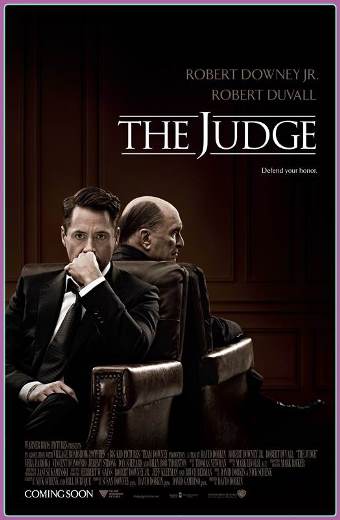THE TAKE AWAY
Movie Review
The Judge
By Kersley Fitzgerald

Okay, we got that out of the way.
The Judge opens with Robert Downey Jr.'s Chicago lawyer Hank Palmer at court, defending a scumbag who probably did it but can afford the best. A phone call in the middle of a session reveals Hank's mother has died, leading him to request a suspension of the trial. As he leaves his house for the airport, we learn he adores his young daughter, but he's a workaholic and he's broken and angry from his wife's lonely infidelity.
At home in Indiana, we meet Hank's brothers (the elder works at a garage after a promising baseball career was cut short; the younger appears to be on the Autism spectrum), his ex-girlfriend, and his cantankerous, controlling father, played by Robert Duvall. After the funeral, Hank's plane is pulling away from the gate when he gets a call that his father is being charged with a hit and run that killed an ex-con. Hank stays in town to defend his father.
The movie flows well. It really feels like you're entering into the middle of the story, but the flashbacks and explanations are nicely timed. Duvall is amazing, as always, seamlessly switching from semi-abusive to broken to ironically amused. RDJ's character feels like a version of himself, as most of his characters do.
[Spoilers]
The tension behind the movie is very true. Hank hasn't been home since his father, the Judge, gave him a harsh sentence for a drunken rollover crash. Hank finally learns that the sentence wasn't because of the Judge's image as a pillar of the community, but because the Judge was terrified of the path Hank would take if he didn't turn around. Hank did turn around, to the point of being first in his class at Georgetown Law School, but his bitterness with his father's seeming lack of compassion drove him away. Meanwhile, the Judge's pride kept him from picking up the phone or acknowledging his son's achievements.
I don't suppose there's a decent parent out there who hasn't faced this choice — Exactly how hard do I need to be to get my kid's attention? How hard would be too hard and push him away?
It's also interesting to see how the Judge's treatment of Hank affected Hank's personal and professional lives — he values family but not justice. In the courtroom, he uses all of his skills to defend his clients, without any concern for their actual guilt. But he is fiercely devoted to his daughter. Despite his anger with his wife and his impending divorce, he won't sleep with his ex (although he does make out with her). And when his father needs him, he's willing to suffer abuse and indignity to help, even when the Judge tells him to leave. It's only when his relationship with his dad switches again from justice to family that Hank knows his place and begins to value the justice he thought his father had denied him.
I think that's probably the underlying theme. A screw-up, caught between his superstar older brother and his special-needs younger brother, Hank didn't feel he got the father he needed. It was only when his father needed him that they learned to relate. And in the end, he came to value both family and justice.
Tags: Current-Issues | Family-Life | Reviews-Critiques
comments powered by Disqus
Published 10-22-14

